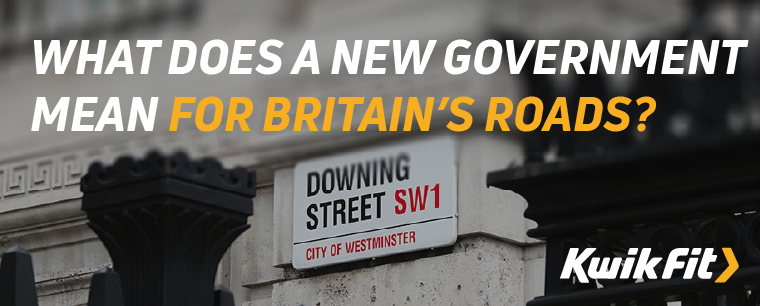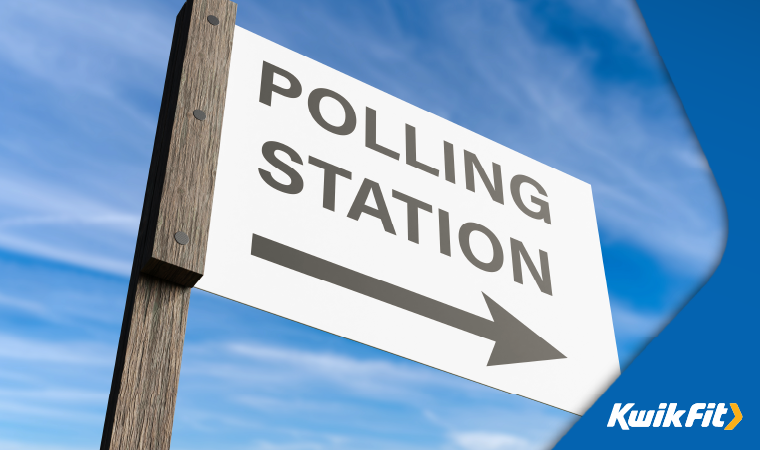What Does a New Government Mean for Britain’s Roads?
Jack Dreyer | Monday 22nd July 2024 8:00am

The Labour Party saw a dramatic victory after the 4th of July snap election and, with a new government, there is now an opportunity for a flurry of new policies across a number of key areas.
As a leading car servicing and repair company, we are naturally interested in the potential changes for motorists and road policies in the coming months and years. If you’re also curious as to what a new government means for Britain’s roads, read on.
Labour’s manifesto
Labour made a number of promises in their manifesto which will likely be implemented over the next few years. This includes:
- Fixing a million potholes a year - a much-welcomed policy which will make Britain’s roads more pleasant to drive on, but even more importantly, safer for all types of road users. Especially seeing as potholes cost UK drivers £1.5 billion a year in repairs.
- Investigate “rip-off” car insurance prices.
- EV charge point expansion.
- Reinstating the 2030 cut-off for petrol and diesel new car sales.
- Standardised labelling for cars - This includes a requirement for second-hand or used EVs to have a battery condition monitor.
- EV gigafactory funding - This includes research and development investment, although we would be interested in knowing what plans there will be for EV battery recycling.
We’re certainly optimistic about many of these points and see that there is a lot of room for growth from these core policies. In this blog, we want to investigate things further by laying out three main areas we would like to see considered by the new government.
1. Improving our roads’ safety
Earlier this year, the previous government announced that £38.3 million would be designated for safety enhancements on 17 high-risk roads across England. This was just a small part of a broader £185.8 million investment targeting 99 roads. We welcomed this at the time, and would like to see that our busiest roads are kept maintained with proper surfacing and markings - so that safety is improved, and emissions reduced.
So, the Government’s pledge to repair a million potholes a year is a welcome move towards wider road improvement. However, we would want to see that commitments are made to consistent and effective funding. This should be part of a much larger effort to cut road casualties across the UK, with better road maintenance, signage, and surfacing helping towards that.
2. Support the transition to EVs
Kwik Fit supports the transition to electric vehicles, and wants to see more effective servicing and charging for EVs across the country. Many would also like more stability and clarity when it comes to this transition, as changes relating to the 2030 cut-off date can be confusing; a consistent, well-executed approach is needed here.
Announcements around EV gigafactory and R&D funding are welcome, as is the expansion of EV charging ports, but we would also like to see more battery recycling plants across the UK.
The last government initiated a few conversations earlier this year about levelling up or expanding on former industrial areas where there is a disparity in unemployment levels. This conversation could expand in a holistic way towards not just the opening of EV factories and recycling centres, but also, as mentioned in the previous section, the development of roads and motorways. This could also include a focus on EV charging ports in car parks and in new housing developments, which have been planned by the new Labour Government.
As a result of the new government, many are hoping to see that, as part of the transition to electric vehicles, there is an active effort to make EVs more affordable, to maintain the road tax exemptions, and to make maintenance, charging, and services easier to access and cheaper to perform. If EVs become effectively cheaper to buy, run, ‘fuel’, and maintain than combustion vehicles, then we will see a far more effective transition in the future.

3. Tackle cost of living for motorists
With the state opening of parliament on the 17th of July, the Government outlined many of its top priorities for the year with the King’s Speech. This has been met with both praise and caution by various groups, in part as it seems that the Government is keen on improving and, some might say radically, changing transport and connections.
For a few years now, we’ve been advising and reporting on the cost of living crisis and how it has affected motorists. Each one of our 600+ centres is embedded in the area it serves, with many of our technicians coming from those local areas, and we’re proud to serve a wide range of customers from different walks of life.
We want people to be able to afford to drive, for work and for pleasure, and to keep vehicles in safe conditions. We previously reported on the fact that a whopping 49% of drivers avoided car maintenance due to the cost of living. This included 23% of people putting off repairing worn brakes, for example, which has potentially dangerous consequences.
We’ve also found there is a 180% increase in the number of cars registered as SORN, which indicates that people may be unable to afford road taxes and maintenance on their vehicles.
We’re keen on showing drivers how to increase fuel efficiency on their car or how to save money on basic maintenance, and we offer a number of free services, such as our vehicle safety check. This is all part of our pledge to help keep the UK’s roads, and the people that drive on them, as safe as possible.
Tackling fuel costs
Many are keen to see that the new government, along with their policies of nationalising railways, as announced on the 17th, encouraging EV charging and pothole maintenance, also tackle day-to-day costs which accumulate for many drivers. This includes making sure that fuel prices are fairer, by setting up the Pumpwatch scheme and a price monitoring body to balance the cost of fuel across all areas of the UK.
Reducing the motor insurance burden
Part of this ‘daily cost easing’ would be with the hope Labour maintains their commitment to investigate ‘rip-off’ insurance prices, and to reduce the motor insurance tax burden. This would include Labour fulfilling their promise to call on the FCA (Financial Conduct Authority) to investigate motor insurers’ premiums, to make sure they are actually fair. Many are also calling for a reduction in Premium Tax from 12%, which disproportionately affects younger drivers.
Reduce accumulative costs of driving
Part of the reduction in costs which accumulate over time is in making sure that motoring offences are enforced fairly. There are a lot of details here, but part of this would be the government ensuring local councils are given proper guidelines to follow regarding yellow box junctions and the Parking Code of Practice.
Hopes are that any new development on roads, as part of the larger safety overhaul, would include clearer signage and road markings, leading to fewer breaches of code. Car parks allowing for two methods of payment at all times, and the consolidation of apps so that people aren’t caught out, are other potentially popular suggestions on the theme.
Hope for better transport
Many in the motoring world were happy to see a renewed commitment under the previous government towards road infrastructure, safety, and fairness in costs and taxes, and see a lot of room for further expansion of these policies under the new government.
Several of the main parties recognised the importance of better infrastructure and fairer costs, and an effective transition to EVs - showing the value that these themes have when it comes to the national conversation around driving in the UK.
As we have highlighted in this piece, we’ve always been committed to helping people save money, and stay safe on the roads, by maintaining their cars properly with efficient, effective services.
For those who have perhaps put off any maintenance because of costs, we have a free safety check for cars, and for those who want to wrap up some of their costs into a subscription, we have our Kwik Fit Club.
If you want to know more about how to maintain your car, or are interested in some of our assessments and reports on road policy, then check out our blog. If you have any concerns about your vehicle, or need an MOT or service, then why not come into your nearest centre today?
Any facts, figures and prices shown in our blog articles are correct at time of publication.
Featured Articles
Is it Illegal to Drive With One Headlight?
Saturday 19th July 2025
Wondering if it’s illegal to drive with one headlight? Learn about the safety risks and penalties of illegal blown bulbs and why you should fix them promptly.
Air Con in EVs & Hybrids: Experts Answer Your Questions
Monday 30th June 2025
Does air con drain EV batteries? Can you use the air con while charging an electric car? Find out the answers to these questions & more from Kwik Fit’s experts.
Why Is Your Car Making a Noise? Fixes & Tips
Friday 13th June 2025
When your car starts making unexpected noises, it can certainly be quite disconcerting; it may be nothing to worry about, but here’s what you need to know.









